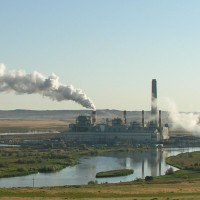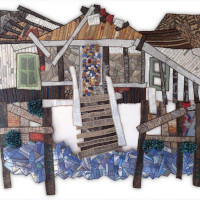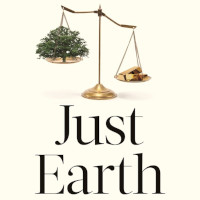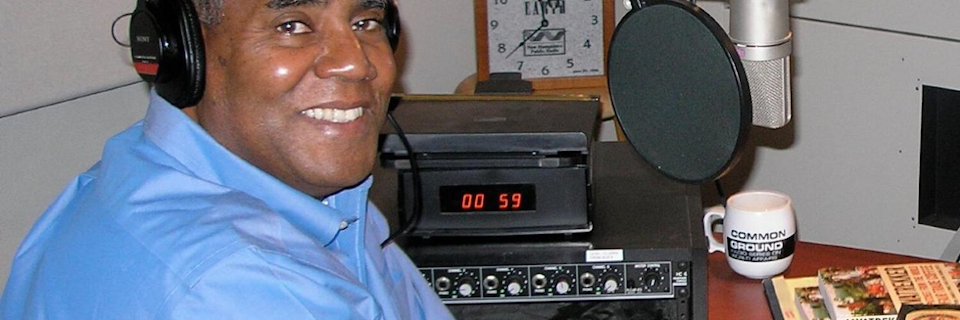
EPA Ignores Climate Dangers
This June the US Environmental Protection Agency proposed eliminating regulations that limit climate changing gases from power plants, about a quarter of US emissions. Harvard Law Professor Richard Lazarus speaks about the perils of the broader Trump administration effort to weaken federal environmental protections.

From Plastic Trash to Art
The ugly truth of plastic is that the world produces over 400 million metric tons each year and recycles less than ten percent of it. But artist Erik Jon Olson is transforming unsightly plastic waste into beautiful, quilted works of art which are popping up in galleries and exhibitions across the United States. He shares the meaning and method behind his whimsical and striking artwork.

Just Earth: How a Fairer World Will Save the Planet
In his recent book Just Earth: How a Fairer World Will Save the Planet, Tony Juniper explores how tackling economic inequality within and between countries will go far to solve the climate and biodiversity crises. Tony Juniper has long advised King Charles III on the environment and climate and now chairs Natural England. He discusses the transformation that’s urgently needed to allow planet and people to thrive.
This Week’s Show
June 27, 2025
listen / download

EPA Ignores Climate Dangers
listen / download
This June the US Environmental Protection Agency proposed eliminating regulations that limit climate changing gases from power plants, about a quarter of US emissions. Harvard Law Professor Richard Lazarus speaks about the perils of the broader Trump administration effort to weaken federal environmental protections.

From Plastic Trash to Art
listen / download
The ugly truth of plastic is that the world produces over 400 million metric tons each year and recycles less than ten percent of it. But artist Erik Jon Olson is transforming unsightly plastic waste into beautiful, quilted works of art which are popping up in galleries and exhibitions across the United States. He shares the meaning and method behind his whimsical and striking artwork.

Just Earth: How a Fairer World Will Save the Planet
listen / download
In his recent book Just Earth: How a Fairer World Will Save the Planet, Tony Juniper explores how tackling economic inequality within and between countries will go far to solve the climate and biodiversity crises. Tony Juniper has long advised King Charles III on the environment and climate and now chairs Natural England. He discusses the transformation that’s urgently needed to allow planet and people to thrive.
Special Features
Field Note: "After the Storm"
Living on Earth's Explorer-in-Residence, Mark Seth Lender, ruminates on the storm as it meets the shore.
Blog Series: Mark Seth Lender Field Notes
Field Note: "Countermeasures"
Living on Earth's Explorer-in-Residence, Mark Seth Lender, shares observations about shorebirds in flight.
Blog Series: Mark Seth Lender Field Notes
...Ultimately, if we are going prevent large parts of this Earth from becoming not only inhospitable but uninhabitable in our lifetimes, we are going to have to keep some fossil fuels in the ground rather than burn them...
-- President Barack Obama, November 6, 2015 on why he declined to approve the Keystone XL Pipeline.
Donate to Living on Earth!
Living on Earth is an independent media program and relies entirely on contributions from listeners and institutions supporting public service. Please donate now to preserve an independent environmental voice.
NewsletterLiving on Earth offers a weekly delivery of the show's rundown to your mailbox. Sign up for our newsletter today!
 Sailors For The Sea: Be the change you want to sea.
Sailors For The Sea: Be the change you want to sea.
 The Grantham Foundation for the Protection of the Environment: Committed to protecting and improving the health of the global environment.
The Grantham Foundation for the Protection of the Environment: Committed to protecting and improving the health of the global environment.
 Contribute to Living on Earth and receive, as our gift to you, an archival print of one of Mark Seth Lender's extraordinary wildlife photographs. Follow the link to see Mark's current collection of photographs.
Contribute to Living on Earth and receive, as our gift to you, an archival print of one of Mark Seth Lender's extraordinary wildlife photographs. Follow the link to see Mark's current collection of photographs.
 Buy a signed copy of Mark Seth Lender's book Smeagull the Seagull & support Living on Earth
Buy a signed copy of Mark Seth Lender's book Smeagull the Seagull & support Living on Earth








.png)

